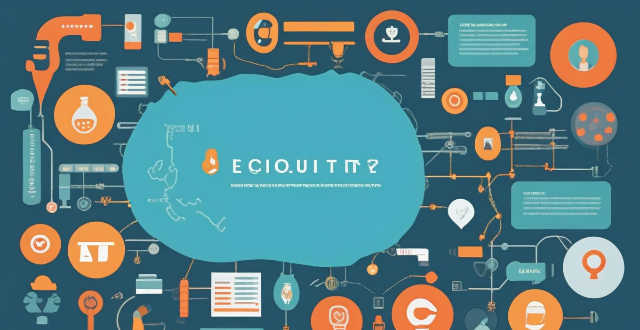Student Equity

How does educational equity impact student success ?
Educational equity is crucial for student success. It ensures access to quality education, reduces socioeconomic disparities, and promotes diversity and inclusion. Educational equity positively impacts academic achievement, social and emotional development, career opportunities, and civic engagement. Achieving educational equity requires collective efforts from educators, policymakers, and community members.

What is educational equity and why is it important ?
Educational equity is the principle that all students, regardless of their background or circumstances, should have access to high-quality educational opportunities. It involves providing equal resources, support, and services to ensure that every student can achieve their full potential. The importance of educational equity lies in promoting social justice, reducing achievement gaps, increasing student motivation, preparing students for future success, and promoting diversity and inclusion. By addressing disparities in education and promoting equal treatment for all students, we can help create a fair and just society where every individual has an equal opportunity to succeed.

What role do teachers play in promoting educational equity ?
The article discusses the role of teachers in promoting educational equity, which is defined as providing equal opportunities for all students to succeed academically regardless of their background or circumstances. Teachers can contribute to achieving educational equity by creating an inclusive learning environment, adopting personalized learning approaches, collaborating with stakeholders, and advocating for equitable policies and practices. They must ensure that every student has access to quality education and is given the necessary support to achieve their full potential.

What are the challenges to achieving educational equity ?
Educational equity is a critical issue in modern society, but achieving this goal is not without its challenges. Some of the major obstacles that hinder the progress towards educational equity include limited resources, socioeconomic disparities, systemic racism and discrimination, and lack of parental involvement. It is essential for policymakers, educators, and communities to work together to develop strategies that promote equal access to quality education for all students.

How does educational equity relate to social justice ?
Educational equity and social justice are interconnected concepts that aim to create a fair and just society. Educational equity involves providing equal opportunities for learning and addressing disparities in resources, funding, and support services between schools or communities. Social justice encompasses policies and practices that ensure everyone has equal rights, opportunities, and access to resources while eliminating discrimination based on various factors. The relationship between educational equity and social justice includes addressing systemic inequalities within the education system, providing access to quality education for all students, promoting diversity and inclusion, and empowering students to become agents of change in their communities. By achieving educational equity, we can work towards creating a more just and equitable society.

What impact does multicultural education have on student achievement ?
The article discusses the impact of multicultural education on student achievement. It states that this type of education increases students' cultural awareness and sensitivity, enhances their critical thinking skills, and improves academic performance. Students become more aware of their own cultural biases and learn to appreciate diversity, leading to better relationships with peers and teachers. Multicultural education also encourages students to question authority figures and challenge dominant narratives, promoting independent thought and creativity. Research has shown that when students feel valued and respected for their unique cultural backgrounds, they are more likely to engage in learning activities and perform well academically. Overall, multicultural education creates an inclusive learning environment that promotes equity, social justice, and respect for all cultures, preparing students for success in an increasingly diverse world.

How does private equity differ from public equity ?
Private equity and public equity are two different types of investment vehicles that offer distinct characteristics, benefits, and risks. Private equity refers to investments in companies that are not publicly traded on stock exchanges, while public equity refers to investments in companies that are publicly traded on stock exchanges. Key differences between private equity and public equity include accessibility, liquidity, regulation, investment horizon, and returns. Private equity investments are typically only available to accredited investors, such as institutional investors, high net worth individuals, and family offices. Public equity investments are more accessible to a wider range of investors, as anyone can buy shares of publicly traded companies on stock exchanges. Private equity investments are generally illiquid, meaning it can be difficult to sell your stake in a company if you need to exit the investment. Public equity investments are highly liquid, as shares of publicly traded companies can be easily bought and sold on stock exchanges. Private equity firms are not subject to the same level of regulation as publicly traded companies. This allows them greater flexibility in managing their investments and making strategic decisions without the scrutiny of public markets. Publicly traded companies are subject to strict regulations and reporting requirements set by regulatory bodies such as the Securities and Exchange Commission (SEC). Private equity investments typically have a longer investment horizon than public equity investments. This is because private equity firms focus on long-term growth and value creation within the companies they invest in. Public equity investments can be held for shorter periods of time, as investors can easily buy and sell shares on stock exchanges based on market conditions and personal financial goals. Private equity investments often aim for higher returns than public equity investments, as they involve higher levels of risk and illiquidity. However, these returns are not guaranteed and depend on the success of the companies being invested in. Public equity investments may offer more stable returns over time, as publicly traded companies tend to be more established and have a proven track record of financial performance. In conclusion, private equity and public equity offer different advantages and disadvantages depending on an investor's goals, risk tolerance, and investment horizon. It is important for investors to carefully consider their investment objectives and risk profile before choosing between private equity and public equity investments.

How does a home equity loan work in relation to my mortgage ?
A home equity loan allows homeowners to borrow against the equity in their property, serving as a second mortgage without requiring refinancing. It offers advantages such as lower interest rates and potential tax deductions but also presents risks like foreclosure and additional debt. Understanding how it works in relation to your primary mortgage is crucial for making an informed financial decision.

How can vaccine equity be achieved globally ?
Vaccine equity is crucial for global health, but challenges like funding shortages and misinformation hinder progress. Increasing funding, improving infrastructure, promoting education, and encouraging international cooperation can help achieve vaccine equity globally.

What is private equity ?
Private equity (PE) is an investment strategy where funds pool capital from institutional investors to directly invest in companies. This involves buying out existing shareholders or providing growth capital, with the aim of improving operations and selling at a profit. Key features include long-term investments, active ownership, diverse strategies, and a clear exit strategy. Types of PE include leveraged buyouts, venture capital, growth equity, mezzanine financing, and secondaries. Private equity firms play roles in due diligence, deal structuring, operational improvement, financial management, and exit planning. Benefits of PE include economic growth, job creation, and operational expertise, while criticisms include high debt loads, short-term focus, and potential negative labor impacts.

What are the benefits of investing in private equity ?
Investing in private equity offers higher potential returns, diversification benefits, active management and control, access to unique opportunities, tax efficiency, and a disciplined approach to investing. However, it also comes with risks such as illiquidity, high entry barriers, and the need for specialized knowledge. Proper due diligence and consideration of one's overall investment objectives and risk tolerance are essential before committing capital to private equity.

How do private equity firms value companies ?
Private equity firms value companies using various methods, includingPrivate equity firms value companies using various methods, including, discounted cash flow ( These approaches help them assess the company's financial health, market position, growth potential, and risks to make informed investment decisions.

How do private equity firms make money ?
Private equity firms generate profits through various strategies, includingPrivate equity firms generate profits through various strategies, includingLBOs), growth capital including leveraged buyouts (LBOs), growth capital investments, and venture capital investments. LBOs involve acquiring companies with debt and equity financing to improve their value for a higher sale price or public offering. Growth capital investments provide funding to established companies with growth potential but not ready for an LBO or public offering. Venture capital investments target early-stage startups with high growth potential but limited track records. Private equity firms manage risk by diversifying across industries and geographies, conducting thorough due diligence, actively involving portfolio company management, and monitoring financial performance metrics. By balancing risk and reward, they can achieve consistent returns over time while minimizing losses from individual investments.

How does private equity affect corporate governance ?
Private equity (PE) plays a significant role in shaping the governance of companies. It can have both positive and negative impacts on corporate governance, depending on various factors such as the PE firm's strategy, the nature of the investment, and the target company's existing governance structure. This article will explore the ways in which private equity affects corporate governance. ### Positive Impacts of Private Equity on Corporate Governance - **Improved Decision-Making Processes**: Private equity firms often bring fresh perspectives and expertise to the decision-making processes within a company. They may introduce new management practices or technologies that enhance efficiency and productivity. This can lead to better strategic planning and more informed decisions being made by the board of directors. - **Greater Transparency and Accountability**: Private equity investors typically demand greater transparency and accountability from the companies they invest in. This can result in improved financial reporting, regular board meetings, and increased communication between management and shareholders. Such measures help to ensure that all stakeholders are kept informed about the company's performance and future plans. - **Increased Focus on Long-Term Value Creation**: Private equity firms generally have a long-term investment horizon, which means they are more likely to focus on creating value over the long term rather than pursuing short-term gains. This can lead to a greater emphasis on sustainable growth, innovation, and responsible business practices. ### Negative Impacts of Private Equity on Corporate Governance - **Potential Conflicts of Interest**: Private equity investors may have conflicts of interest with other stakeholders, such as employees, customers, or suppliers. For example, a PE firm might push for cost-cutting measures that negatively impact employee morale or customer satisfaction. These conflicts can undermine good governance practices and harm the company's reputation. - **Pressure for Short-Term Profits**: While some private equity firms focus on long-term value creation, others may prioritize short-term profits at the expense of long-term sustainability. This can lead to excessive risk-taking, aggressive financial engineering, or even fraudulent activities aimed at boosting short-term earnings. Such behaviors can ultimately damage the company's reputation and financial health. - **Lack of Diversity in Board Composition**: Private equity firms often control a majority of the seats on a company's board of directors. This can limit diversity in terms of gender, ethnicity, and professional background among board members. A lack of diversity can lead to groupthink and reduce the effectiveness of the board in providing independent oversight and guidance to management. In conclusion, private equity has both positive and negative effects on corporate governance. The key is for PE firms to balance their pursuit of profit with a commitment to ethical business practices and responsible stewardship of the companies they invest in. By doing so, they can help build stronger, more sustainable businesses that benefit all stakeholders.

What are some notable private equity firms ?
Private equity firms are investment companies that pool funds from various investors to acquire and manage private companies, typically investing in undervalued or distressed businesses, restructuring them, and selling them at a profit. Some of the most notable private equity firms include Blackstone Group, The Carlyle Group, Kohlberg Kravis Roberts & Co. (KKR), TPG Capital, and Warburg Pincus. These firms have diverse portfolios and investment strategies, with assets under management ranging from $600 billion to $79 billion as of 2022.

How can we promote educational equity in schools ?
Promoting educational equity in schools is crucial to ensure all students have equal access to high-quality education. Strategies include addressing socioeconomic disparities, ensuring quality teaching, aligning curriculum and assessments, investing in technology and infrastructure, and fostering a supportive school culture. Specific actions range from providing financial assistance to low-income families, hiring diverse teachers, revising curriculum, and offering counseling services. By implementing these strategies, we can work towards ensuring every student has an equal opportunity to succeed regardless of their background or circumstances.

What are the risks associated with private equity investments ?
Private equity investments are a type of investment where an investor puts money into a private company, typically with the expectation of high returns. While these investments can offer substantial rewards, they also come with significant risks such as illiquidity, lack of transparency, high volatility, management risk, exit strategy uncertainty, valuation challenges, economic cycles, and legal and regulatory changes. Proper research, diversification, and patience are key to navigating the challenges associated with private equity investments.

What is the future outlook for private equity ?
Private equity (PE) is a dynamic sector of the financial industry that involves investing in or acquiring companies, typically with the aim of improving their operations and selling them at a profit within a few years. The future outlook for private equity is influenced by various factors such as economic conditions, technological advancements, regulatory changes, and market trends. Here's a detailed analysis of what the future might hold for private equity: Economic Influences: Global Economic Growth, Interest Rates, Market Volatility Technological Advancements: Digitization, Artificial Intelligence and Machine Learning, Blockchain Regulatory Changes: Stricter Regulations, Tax Laws Market Trends: ESG Investing, Diversification, Exit Strategies Industry Evolution: Consolidation, Secondary Markets, Direct Investments Challenges and Opportunities: Competition, Talent Retention, Innovation In conclusion, the future of private equity looks promising but not without its challenges. The industry is set to evolve with changing economic conditions, technological advancements, regulatory shifts, and market trends. PE firms that adapt and innovate will be well-positioned to thrive in this dynamic environment.

How can parents support educational equity for their children ?
Educational equity is a fundamental principle that ensures all children, regardless of their backgrounds, have equal access to quality education. As parents, supporting educational equity can make a significant difference in your child's learning journey and the community at large. Here are some ways you can contribute: 1. Advocate for equal resources by engaging with school administration and supporting funding initiatives. 2. Foster inclusivity at home by educating yourself and your child about diversity and promoting empathy. 3. Provide equal opportunities at home by creating a learning environment and encouraging extracurricular activities. 4. Collaborate with other parents by building networks and working together on school projects. 5. Stay informed and up-to-date by reading educational literature and attending workshops, as well as using technology wisely to leverage online resources and monitor progress.

What are the pros and cons of taking out a student loan ?
Student loans can help students afford college, but also come with long-term debt and limited job opportunities.

How can educational technology enhance student engagement ?
The text discusses how educational technology can enhance student engagement. It outlines various methods such as personalized learning, interactive content, collaborative tools, real-time feedback, and flexible learning options that educators can use to improve student participation and performance in the classroom.

What role do pharmaceutical companies play in promoting vaccine equity ?
Role of Pharmaceutical Companies in Promoting Vaccine Equity: - **Introduction**: Discusses the importance of vaccines and the challenge of vaccine equity. - **Development and Production of Vaccines**: Covers research, development, manufacturing, and quality control measures. - **Availability and Affordability of Vaccines**: Includes pricing strategies and partnerships with governments and NGOs. - **Improving Access to Vaccines**: Discusses global health initiatives and technology transfer/capacity building efforts. - **Conclusion**: Reinforces the critical role of pharmaceutical companies in promoting vaccine equity.

What policies can governments implement to promote educational equity ?
Policies for Promoting Educational Equity summarizes key policies governments can adopt to ensure equal access to quality education for all students, regardless of their socio-economic background, race, gender, or any other factors. These policies include universal access to education, quality education, inclusive education, reducing socio-economic disparities, promoting gender equality, addressing racial and ethnic disparities, and collaboration and partnerships with non-profit organizations, private sector companies, and community groups.

Do any restaurants offer student discounts ?
Students often look for ways to save money, and one such way is by utilizing student discounts offered by various establishments, including restaurants. In this response, we will explore if there are any restaurants that offer student discounts and what benefits they provide. Yes, there are several restaurants that offer student discounts, which can vary from place to place and may not be advertised openly. Therefore, it is important to ask the staff or check their website before visiting. The benefits of student discounts at restaurants include saving money, trying new places, socializing, and convenience. To find out if a restaurant offers student discounts, you can check their website, ask the staff, or search online. Examples of restaurants that offer student discounts include McDonald's, Subway, Pizza Hut, Dairy Queen, and Burger King. In conclusion, there are several restaurants that offer student discounts, which can help students save money while enjoying a meal out with friends or family. By checking the restaurant's website, asking the staff, or searching online, you can find out if a restaurant offers student discounts and take advantage of them.

How does educational psychology impact student learning ?
Educational psychology plays a crucial role in understanding and enhancing student learning. It helps educators understand cognitive development, enhance motivation and engagement, promote social-emotional learning, address diverse learning needs, and evaluate teaching strategies and interventions. By incorporating insights from educational psychology into their practice, teachers can create a more effective and supportive learning environment for all students.

How much equity should I be prepared to give up for investment in my startup ?
When determining equity allocation for startup investment, consider theWhen determining equity allocation for startup investment, consider the type of investor, company value Finally, consider the company's goals and vision when deciding on equity allocation, as giving up too much equity can limit future options and affect control over decision-making.

How do student loans impact credit scores ?
Student loans can significantly impact credit scores, positively throughStudent loans can significantly impact credit scores, positively through diversified credit mix, and Best practices for managing student loans include making payments on time, keeping balances low, and exploring forgiveness or repayment options to protect and enhance financial standing.

How can educational psychology improve teacher-student relationships ?
Educational psychology can enhance teacher-student relationships by promoting empathy, clear communication, effective classroom management, emotional intelligence, cultural competence, personalized instruction, and collaboration. Understanding diverse student needs, active listening, consistent messaging, feedback, clear boundaries, fair discipline, self-awareness, managing emotions, inclusivity, adaptability, tailored instruction, personalized attention, parental involvement, and peer support are all strategies that contribute to a positive learning environment.

How do interest rates on student loans work ?
Interest rates on student loans are the percentage of the loan amount that borrowers must pay in addition to the principal balance. The interest rate is determined by the lender and can vary based on factors such as creditworthiness, type of loan, and repayment term. There are two main types of student loans: federal and private. Federal student loans have fixed interest rates that are set by Congress each year, while private student loans have variable or fixed interest rates that are determined by the lender. Interest on student loans begins to accrue as soon as the loan is disbursed, and there are several repayment options available for student loans. By choosing the right type of loan and repayment plan, you can minimize your interest costs and pay off your student loans more efficiently.

How do online learning platforms enhance student engagement and performance ?
The article discusses how online learning platforms enhance student engagement and performance. It mentions personalized learning experiences, interactive content and multimedia, collaboration and communication tools, gamification and rewards, flexibility and convenience, and immediate feedback and support as key features of these platforms that contribute to improved student outcomes.